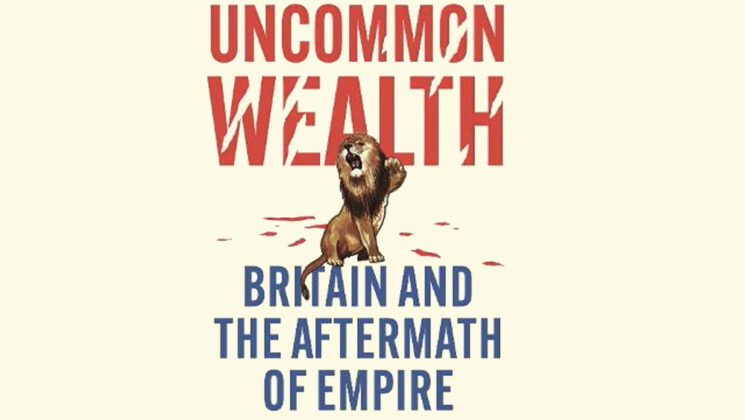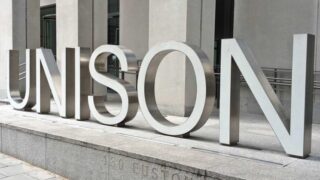Who’s responsible for outsourcing, austerity, the shrinkage of public services and the NHS? According to Kojo Koram, it’s as much colonialism as it is the Conservatives. Privatisation and the shredding of the social safety net are trademark cruelties of Margaret Thatcher’s cabinet, but in his new book Uncommon Wealth, Koram shows us that she was only ever operating from the British colonial rulebook.
The very design of the British Empire was founded on private profiteering, with corporations like the East India Tea Company lining their pockets while securing power and influence for the Westminster government overseas. Fast-forward to 2022, the insatiable greed of private companies is felt much closer to home. In the book’s introduction, Koram summarises the current state of the UK economy: “The country’s wealth is being scurried away offshore while multinational corporations gorge themselves on public resources”. Given the government’s recent decision to hand out billions of pounds to private companies in the form of COVID-19 contracting, Koram’s assessment is hard to argue with.
Koram shows us that the conditions that constrict our lives are not a response to recent economic crises – they are as old as the empire itself.
The boomerang effect
Uncommon Wealth is a time-travelling world tour, where the reader is taken back and forth across continents and centuries to witness how the entrenched inequality we face in Britain today – a cost of living crisis, frantically precarious working conditions and colossal cuts to vital public services – was predetermined by the machinery of the British Empire, and preserved throughout decolonisation.
The book’s central motif is the ‘boomerang’ of colonial relations: that social and economic experiments carried out across the British empire “eventually come flying back to its very heartland”. Using examples from Ghana, Jamaica, Iran and Singapore, Koram illustrates how the empire’s “dynamics of extraction and exploitation” not only enabled Britain to ravage the countries that it colonised but formed the economic structure of current British society.
Koram’s intention with the book is to show how “all of us are bound up in and impacted by the aftermath of empire”, not just “racial groups who are visible descendants of Britain’s colonial legacy”. He successfully makes the case that the British Empire is everyone’s problem and, even more so, that learning about it is crucial for those who wish to challenge inequality today.
Colonialism and corporate interest
A skilful storyteller, Koram weaves economic infrastructure and political history into a smooth read, using the colonial operations in various countries as case studies into how private companies established the global dominance of the Westminster government. This includes the story of BP (first known as the Anglo-Persian Oil Company), established in 1908 Iran. The company’s operations secured Britain’s power in the Middle East, bringing Persia into what Koram describes as ‘Britain’s informal empire’. In 1951, when prime minister Mohammad Mosaddegh decided to nationalise the oil fields and take back what belonged to Iran, Britain treated the matter as property theft. Determined to punish Iran, Britain teamed up with the United States to imprison Mosaddegh and stage a coup in 1953.
The decolonisation period of 1945-1960, when various states in Asia and Africa achieved independence from British rule, brought a new set of challenges for states seeking to achieve sovereignty after colonialism, as well as a new set of challenges for Britain itself. Shifting from an imperial federation to a single state, the Westminster government developed financial systems that could uphold Britain’s power and influence internationally and also maintained vast inequality at home.
Today, as corporate monoliths like Serco, G4S, Atos, Compass and Mitie swallow up more and more contracts, services and jobs, Koram reminds trade unionists that their fight is not just against privatisation, it’s against an ideological vision of a state that selectively enables, rather than directly provides, services. Koram establishes that these assumptions around the state’s role, and its close bonds with private companies and accountancy frameworks determined to protect wealth for the wealthy, are rooted in the formidable structures of power that built the empire.
Austerity
In the last twenty years, successive governments have hollowed out, if not entirely obliterated, our benefits, libraries, nurseries, mental health services and countless other public services. The story that the public is spun is one of austerity: inevitable ‘belt-tightening’ measures necessary to reduce national debts and deficits. This is a repetition of a well-rehearsed narrative told to Jamaica, one of the most important countries in the British Empire, where according to Koram “austerity has become a permanent state of existence.”
The tactic of weaponising national debt to break down public welfare provision is overtly demonstrated by the ‘structural adjustment’ loans that Jamaica took from the World Bank and International Monetary Fund (IMF), which were conditional on cuts to spending on health, education and housing. To this day, Jamaica has repaid more money than it has been lent due to the huge interest on loans, trapping the nation in a position of perpetual subservience to banks, whilst trapping the majority of Jamaicans in poverty.
Koram states that the very notion of sovereign debt, which came about in the period of decolonisation from 1945 onwards (timely, considering the IMF and World Bank were established in 1944), functions as “a useful umbrella under which to remake the economic basis of a society”. His words serve as a warning of what may be to come, considering the vast national debt the UK government has accrued in the fight against COVID-19.
Conclusion
Koram surprisingly offers an invigorating conclusion to the book. Presenting a range of solutions for how to fight economic inequality, including tax justice measures, debt cancellation and a global minimum wage, Koram encourages readers to redirect their anger away from the cacophonous culture wars and towards asset holders.
Challenging the defunct and disproven Brexit mantra of “taking back control”, Koram declares that “true sovereignty would be empowering working people to challenge the interests of global capital”, particularly challenging the runaway power of corporations.
If COVID-19 has taught us anything, it’s that global problems need global solutions. It’s therefore fitting that Uncommon Wealth ends with an internationalist call to arms that recognises the unique role of the British public.




What about pensioners who are not entitled to any benefits just the pension to live on my pension is £87 .45p a week if it was’nt for my husband I would die